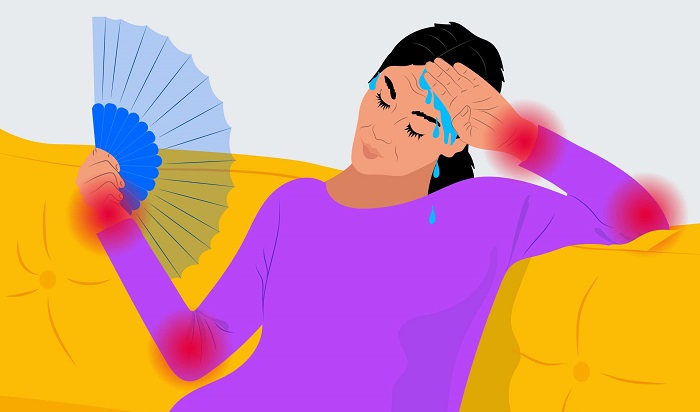
Casual outfits: how to combine them according to the season
September 20, 2020
Perfect selfie: 7 rules for taking a photo like the stars
September 21, 2020Why is Our Body Overheating at Night? Causes and Consequences
The excessive heat of the body at night is a symptom of not working properly, especially in children and the elderly. For them, this condition could indicate a health risk. Generally, the body feels a greater thermal sensation when the humidity level is high. But what are the causes and consequences of body overheating at night?
Table of Contents
ToggleThe causes of body overheating at night
The body can vary its temperature depending on the climatic conditions it is faced with. L ‘ moisture is one of the main reasons why the thermal sensation of our body increases. As a result, it gives off more heat. This means that when the humidity in the air increases, there is a greater thermal sensation than when it decreases.
People who live in very humid climates, especially in coastal areas that exceed 35 ° C, are more likely to feel hotter.
This is especially true with temperatures around 40 ° C. But why, then, does the body give off so much heat? With the sensation of humidity and extreme heat, the body undergoes a greater loss of water and minerals, that is to say, undergoes a phenomenon called dehydration. The latter can manifest itself through an increase in body temperature or, physically, with a feeling of fatigue, tiredness and cramps.
Who suffers the most?
The above explains why the increase in body heat can be risky for the elderly, who are normally in a weaker state. There are also other categories of people who can suffer more from excessive heat, such as young children, women in menopause, those suffering from obesity, those suffering from heart or respiratory diseases, those who work exposed to sunlight or those who practice physical exercise in the open air during the hottest hours.
It is important to remember that hydration is essential to withstand excessive heat and prevent body temperature from rising.
How the body reacts?
To reduce excessive body heat, our body has mechanisms capable of solving the problem. One of them is sweat. This helps to dissipate and regulate body temperature. However, the body can sometimes not completely eliminate excess heat and undergoes alterations known as heat stroke or sunstroke. This happens after unprotected exposure to high temperatures or the sun for a certain period. These two types of alterations are among the most serious and normally have consequences for the body.
Consequences of excess heat at night
If the body gives off a lot of heat, this can be a direct consequence of exposure to excessive heat due to a certain climate. This excess, or overexposure, can cause heat to be deposited in the body at high temperatures with fatal consequences. Some of the more common changes caused by excessive heat are:
- Heatstroke. Also known as insolation, it is the consequence of a more severe excessive body heat, which can be placed above 39.4 ° C-41 ° C for some time between 10 and 15 minutes. This situation can cause very serious damage to the body and, in extreme cases, even death.
- Heat exhaustion. The body stores heat, which can cause a loss of water and mineral salts, which produces exhaustion or profound tiredness.
- Syncope. When the body is subjected to high temperatures, so much heat is stored that causes fainting due to a poor supply of water to the brain tissues. Syncopes are common among older people. They are also highly risky since falling increases the chance of suffering other injuries. To avoid them, you need to drink large amounts of fluids and change your position from time to time, as well as go out for light walks and keep your body moderately active.
- Solar burns. They are caused by long exposure to the sun. They manifest themselves with red and burning skin, the appearance of blisters and even fever.
- Erythema. Excessive heat can also cause erythema, a type of dermatitis that occurs with pimples on the chest, neck, or joints. Erythema is a direct consequence of excessive sweating produced by the body when it gives off heat.
Body temperature and regulation at night
The human body is at a normal temperature of 36.5 ° C or 37 ° C approximately. But keep in mind that it undergoes normal variations around this value. Generally, the temperature follows a circadian rhythm. It means that it is lowest in the early morning and peaks between 4 and 6pm. Furthermore, the normal temperature can also vary according to the time of year as a consequence of the body’s adaptation to different climates. It can vary from one person to another.
Thermoregulation
But how is body temperature regulated at night? The thermoregulatory center is the neuronal area located in the anterior hypothalamus, which has the task of regulating and balancing both the production processes and those of dissipation of body heat through two distinct techniques:
- It increases or reduces the production of heat in the body through metabolic reactions and muscle activity.
- Activate, or deactivate, mechanisms of conservation and/or dissipation of heat. That is, when the body temperature is elevated, the respiratory rate increases and blood vessels dilate. This is to exert more heat when breathing and sweating.
The thermoregulatory center of the hypothalamus is responsible for sending signals to the brain. Thus, the organism reacts in such a way as to avoid the excessive increase in body temperature. As a result, avoid letting your body feel too hot. Acclimatization of the body to different temperatures can take up to a week. More sweat is produced during this time, which will help our circulatory system adapt to rising temperatures.





